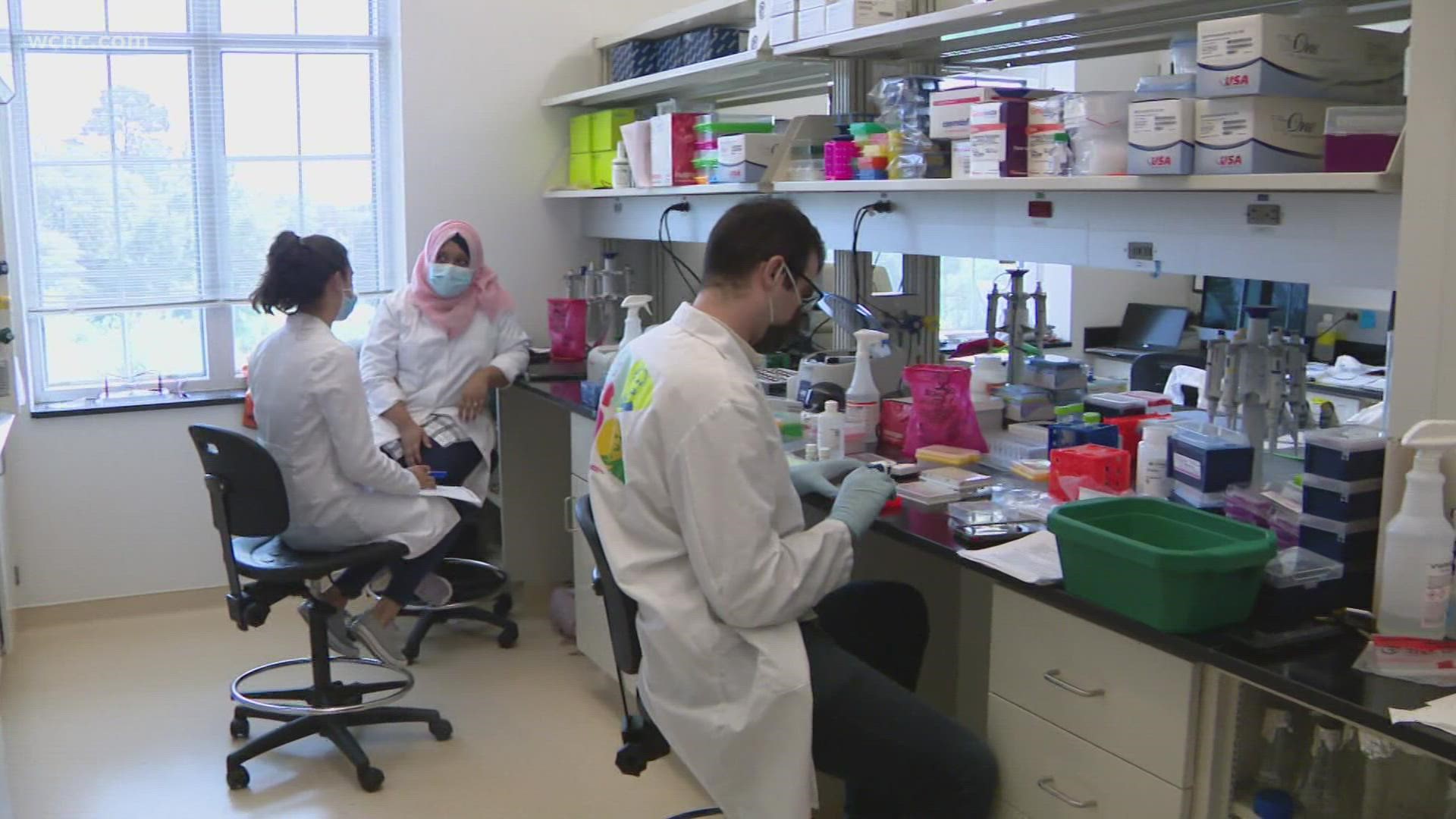MECKLENBURG COUNTY, N.C. — As the COVID-19 omicron variant starts to spread around the world, health experts say it is only a matter of time before it’s detected in the United States and, eventually, in the Carolinas.
Scientists working in genomic sequencing labs will be the first to discover when people are testing positive for the new variant. Genomic sequencing is a method used to figure out the genetic makeup of a cell type or an organism. These scientists work to determine what's causing changes in the genome which helps them understand how the disease or virus forms. Their work often influences diagnosis techniques and treatment options.
In Mecklenburg County, that sort of lab is on UNC Charlotte’s campus. The work completed inside of the bioinformatics and genomics lab is meticulous, difficult and crucial.
“We’re going to see it one way or another,” Dr. Cynthia Gibas, a bioinformatics and genomics professor at UNC Charlotte told WCNC Charlotte.
Gibas is one of the professors leading the genomic sequencing lab.
The lab gets positive COVID-19 tests from the county and through a days-long process, essentially translates the virus’ genes into a language they understand. Viruses are constantly mutating, and researchers can see those changes and determine which variant it is.
They haven’t sequenced omicron yet, but Gibas said they will know it when they see it.
“There are about 50 mutations in omicron, and I think about 25 of them are unique to that strain," she said. "So, even if we have a little bit of adjustment to the method that we have to use, we’ll get a good enough coverage of the genome probably right away to be able to tell the first time that we see it. There’s just so much change there, relative to the other strains, that I think it’s going to be pretty easy to distinguish in the sequencing.”
The work they’re doing is critical to guiding the public health response.
“Public health authorities have to know what strains are spreading so they can take appropriate measures,” Gibas said.
North Carolina Gov. Roy Cooper said during a news conference on Tuesday they do not anticipate any major changes in statewide restrictions, but they are emphasizing the importance of getting vaccinated.
The top epidemiologist at Atrium Health, Dr. Katie Passaretti, said this is an opportunity to be proactive instead of reactive.
“When we already know there are cases in multiple countries, multiple parts of the world, the writing is on the wall that at some point omicron will likely be here,” Passaretti said.
Most of North Carolina has downgraded into the orange zone, but as some COVID-19 trends start to inch back up, layers of protection will be essential.
“The most important things we can do to protect ourselves are getting our vaccination rates up, and then, I do think it makes sense going into the holidays, going into times of gathering, to think about your indoor gatherings and masking in those settings is going to, in my mind, be important in the coming months,” Passaretti said.
Doctors are stressing the importance of the booster shot too. Anyone 18 and older who got Pfizer or Moderna six months ago, or Johnson & Johnson two months ago, should get another dose.
Doctors say those who got Johnson & Johnson are the people who would benefit the most from mixing and matching brands.
Contact Chloe Leshner at cleshner@wcnc.com and follow her on Facebook, Twitter and Instagram.
WCNC Charlotte is part of seven major media companies and other local institutions reporting on and engaging the community around the problems and solutions as they relate to the COVID-19 pandemic. It is a project of the Charlotte Journalism Collaborative, which is supported by the Local Media Project, an initiative launched by the Solutions Journalism Network with support from the Knight Foundation to strengthen and reinvigorate local media ecosystems. See all of our reporting at charlottejournalism.org.

